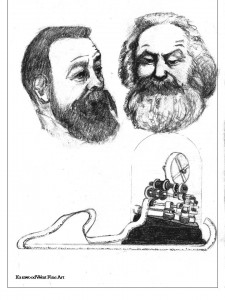A Fool and His Money
February 21
 They were an incongruous pair. One was handsome, debonair and affable. The other was homely, abrasive and overbearing; some regarded him as a genius but most thought him obnoxious. I could be describing Dean Martin and Jerry Lewis. However, I was thinking of Freddie Engels and Charlie Marx.
They were an incongruous pair. One was handsome, debonair and affable. The other was homely, abrasive and overbearing; some regarded him as a genius but most thought him obnoxious. I could be describing Dean Martin and Jerry Lewis. However, I was thinking of Freddie Engels and Charlie Marx.
On this day in 1848, the boys published “The Communist Manifesto“. The pamphlet was not the immediate hit that they had hoped. It did not incite proletariat uprisings and Verdi did not option the script for an opera. Marx and Engels had to keep their day jobs. Engels’ was owning factories and Marx’s was borrowing money from Engels.
Yes, Engels suffered from an embarrassment of riches, and Marx knew how to make the guilt pay off. The textile heir became communism’s first victim and possibly its only willing one. Engel’s fortune subsidized Marx’s ventures into the stock market.
No matter what he told Frau Marx, Karl wasn’t spending all his time at the British Museum. The founder of communism liked to hang around the London Stock Exchange. He was not trying to emancipate the clerks; nor was he simply the disinterested observer of bourgeois financial machinations. In reality, Marx loved to play the market. Unfortunately, he had a dismal investment record; it was bad enough to justify the invention of communism. Yet, Marx never lost a penny in his fiscal fiascoes. Engels did.
In the Marxist system of finance, Engels incurred all expenses and losses, while Marx got any profits. This arrangement, a prototype of today’s mutual funds, can be expressed as, “From leeched, according to his debility; to leech, according to his greed.”